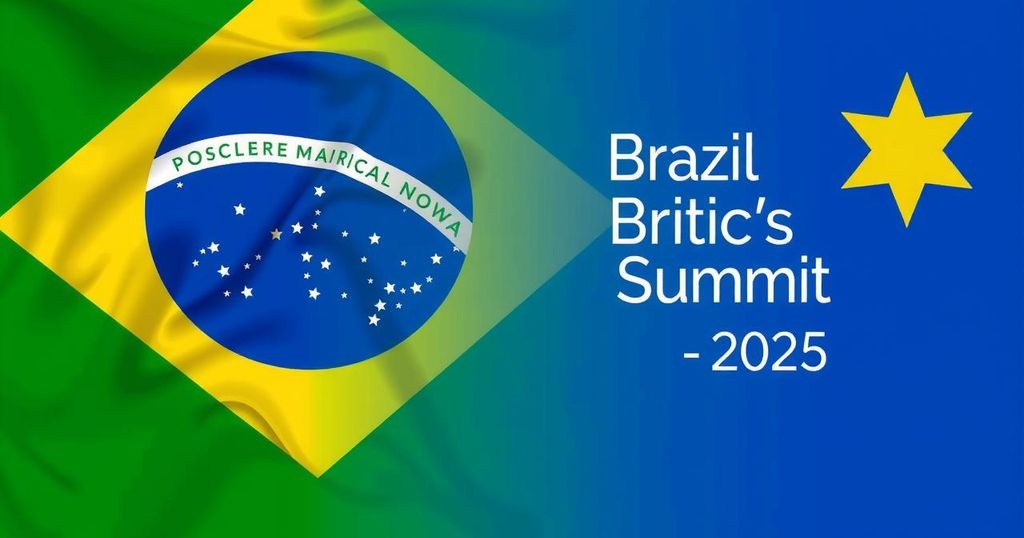Brazil Tries to Hold Sway Within BRICS
Brazil is facing a potential decline in influence within the expanding BRICS group as it welcomes new members, such as Egypt, Ethiopia, Iran, and the UAE. While Brazil made efforts to exclude Venezuela from partnership discussions, it is also solidifying its role in the New Development Bank under Dilma Rousseff’s leadership. The evolving dynamics within BRICS present both challenges and opportunities for Brazil’s foreign policy as it seeks to maintain relevance in this multipolar context.
Brazil, despite being the first country in the BRICS acronym, is grappling with its diminishing influence within the bloc as it expands to include new members. Historically, Brazil held a prominent position due to its exclusivity which was only intensified by the addition of South Africa. However, the recent induction of four countries—Egypt, Ethiopia, Iran, and the United Arab Emirates—signals a notable shift in power dynamics. As BRICS aims for broader international influence, Brazil’s relative economic status compared to larger economies such as China, Russia, and India, and its lack of nuclear capabilities complicate its role within this evolving group. The desire for expansion not only amplifies BRICS’s negotiating power but also diminishes Brazil’s standing, particularly against the backdrop of geopolitical tensions exacerbated by countries like Iran. While Brazil’s Foreign Minister Mauro Vieira suggests that the bloc is aimed at addressing global inequities, the changing composition raises questions about its non-aligned status, especially as China and Russia push for a more anti-Western stance. During the recent BRICS summit in Kazan, Brazil attempted to assert its remaining influence by opposing Venezuela’s entry as a partner. This move was interpreted as a significant diplomatic maneuver against Venezuelan President Nicolás Maduro, whose election Brazil does not recognize. Moreover, Brazil’s Foreign Policy Advisor, Celso Amorim, referred to Venezuela’s exclusion as an issue of “broken confidence,” highlighting the contradictions within the BRICS membership aspirations. On another note, former Brazilian President Dilma Rousseff received support from BRICS to extend her term at the New Development Bank (NDB), highlighting Brazil’s continued engagement in the bloc’s pivotal financial initiatives. As Brazil prepares to assume the BRICS presidency next year, there remains an opportunity for the nation to influence the group’s trajectory, particularly in the context of financial diversification away from the dollar. This intricate landscape of alliances and diplomatic maneuvers places Brazil at a crossroads as it navigates its role in a rapidly evolving BRICS framework, emphasizing the need for strategic decisions that align with its national interests moving forward.
Brazil, historically an important player in the BRICS coalition, is confronting challenges as the group diversifies with new members, which may lead to a decrease in its traditional influence. The addition of nations such as Egypt, Ethiopia, Iran, and the UAE intensifies competition and raises questions about Brazil’s strategic positioning relative to more powerful members like China and Russia. Brazil’s diplomatic efforts are now aimed at mitigating influence from countries that may stray from BRICS’s originally intended non-aligned philosophy. Understanding this backdrop is crucial to appreciating Brazil’s current foreign policy initiatives and its management of regional relationships, particularly concerning Venezuela. As BRICS advances in its objectives to challenge Western-dominated financial systems, Brazil’s role becomes essential, particularly with Rousseff’s influence in the NDB offering a platform for the nation’s strategic interests in financial matters and broader international relations.
In conclusion, Brazil is navigating a complex set of dynamics within BRICS as it contends with an influx of new members that threaten to dilute its influence in the group. The opposition to Venezuela’s membership indicates Brazil’s attempt to assert its diplomatic authority, while its continued leadership role in the NDB showcases its importance within the financial framework of the bloc. As Brazil prepares to chair BRICS, it must strategically align its efforts to maintain relevance and drive initiatives that emphasize its national interests amid the shifting landscape.
Original Source: foreignpolicy.com




Post Comment